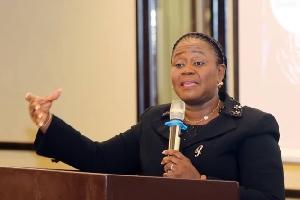 Chief Justice Gertrude Torkornoo
Chief Justice Gertrude Torkornoo
The Chief Justice, Gertrude Sackey Torkornoo, has said that the national conversation comparing the number of justices at the Supreme Court of Ghana (SCOG) to that of the Supreme Court of the United States of America (SCOTUS) is "not well-grounded."
The CJ said the United States of America (USA) practices a federal system of government and has fifty (50) states, but Ghana has one Supreme Court because it operates a unitary state, and therefore, such a comparison cannot be made.
She explained that in the USA, each federal state has a Supreme Court except Oklahoma and Texas, which have two Supreme Courts each (one for civil and one for criminal).
Justice Torkornoo further explained that the number of federal Supreme Court judges varies for each state, with the maximum number being nine (9) and the minimum being five (5).
In a letter to the president, Nana Addo Dankwa Akufo-Addo, dated February 7, 2024, justifying the need to increase the number of Justices of the Supreme Court, the CJ said the comparison does not arise in Ghana's settings.
"The national discourse that compares the numbers of the SCOG and SCOTUS is therefore not at all well-grounded," Justice Torkornoo stated in her letter to the President.
The Chief Justice has come under public criticism following her nomination of five judges to be elevated to the Supreme Court.
The nominees are Justice Afia Serwah Asare Botwe, Justice Eric Kyei Baffour, Justice Asante from the Ecowas Court, Justice Angelina Mensah Homiah, and Justice Pamela Addo Koranteng.
Below is the Chief Justice's argument on the comparison:
Comparative Review of Numbers and Jurisdictions of the SCOG and the Supreme Court of the United States (SCOTUS):
The USA practices a federal system of government and has fifty (50) states.
Ghana has one Supreme Court because Ghana operates as a unitary state.
In the USA, each federal state has a Supreme Court except Oklahoma and Texas, which have two Supreme Courts each (one for civil and one for criminal).
The number of Federal Supreme Court judges varies for each state, with the maximum number being nine (9) and the minimum being five (5).
Information available indicates that, at present, there are three hundred and forty-four (344) Federal Supreme Court judges in America.
This implies that the nine judges of the SCOTUS, with its limited jurisdiction as the Federal Supreme Court, have the base support of 344 state Supreme Court judges providing final decisions for the 50 states.
A review of the jurisdictions of the SCOG shows a wider and larger scope compared to the jurisdictions of the Supreme Court of the United States (SCOTUS), which is an older and more developed democracy.
While the SCOG has jurisdiction over all constitutional interpretation cases, supervisory jurisdiction actions against superior courts, all final chieftaincy, criminal, and civil appeals, all applications for review of its decisions, and any presidential election petitions, the SCOTUS has jurisdiction as the final arbiter in the interpretation of federal law, resolving disputes between states, and interpretation of the Constitution of the USA.
The Supreme Courts of the 50 states deal with all cases within the states.
Cases that may go to the SCOTUS commence hearing in federal courts within states. Further, cases that find their way to the Supreme Court go through a selective process before being considered for hearing.
Between 2018 and 2023, the three-year period under review, the following numbers of cases were filed in and heard by the SCOTUS as compared to the number of matters filed in the SCOG.
In the face of it, as many as 6,442 cases were filed for consideration by the SCOTUS in 2018/19; the court considered 73 and wrote opinions in 69.
In the 2022–23 legal year, it considered and wrote opinions in 60 cases.
The SCOG, on the other hand, has no authority to apply any selective criteria to pick out cases that ought to be heard.
It is saddled with hearing all matters filed in order to make a decision, however incompetent, vexatious, or frivolous the application or appeal may be.
The SCOG is given extremely limited discretion under Article 132 of the 1992 Constitution to grant special leave for appeals against certain decisions of the Court of Appeal that have been extensively considered by lower courts.
This limited discretion only applies when applications are made for special leave to appeal and not in any other matter.
If an appeal is filed without the application for special leave, the SCOG still has to hear the appeal and produce a decision to show why the appeal ought to be dismissed for want of special leave.
The national discourse that compares the numbers of the SCOG and SCOTUS is therefore not at all well grounded.